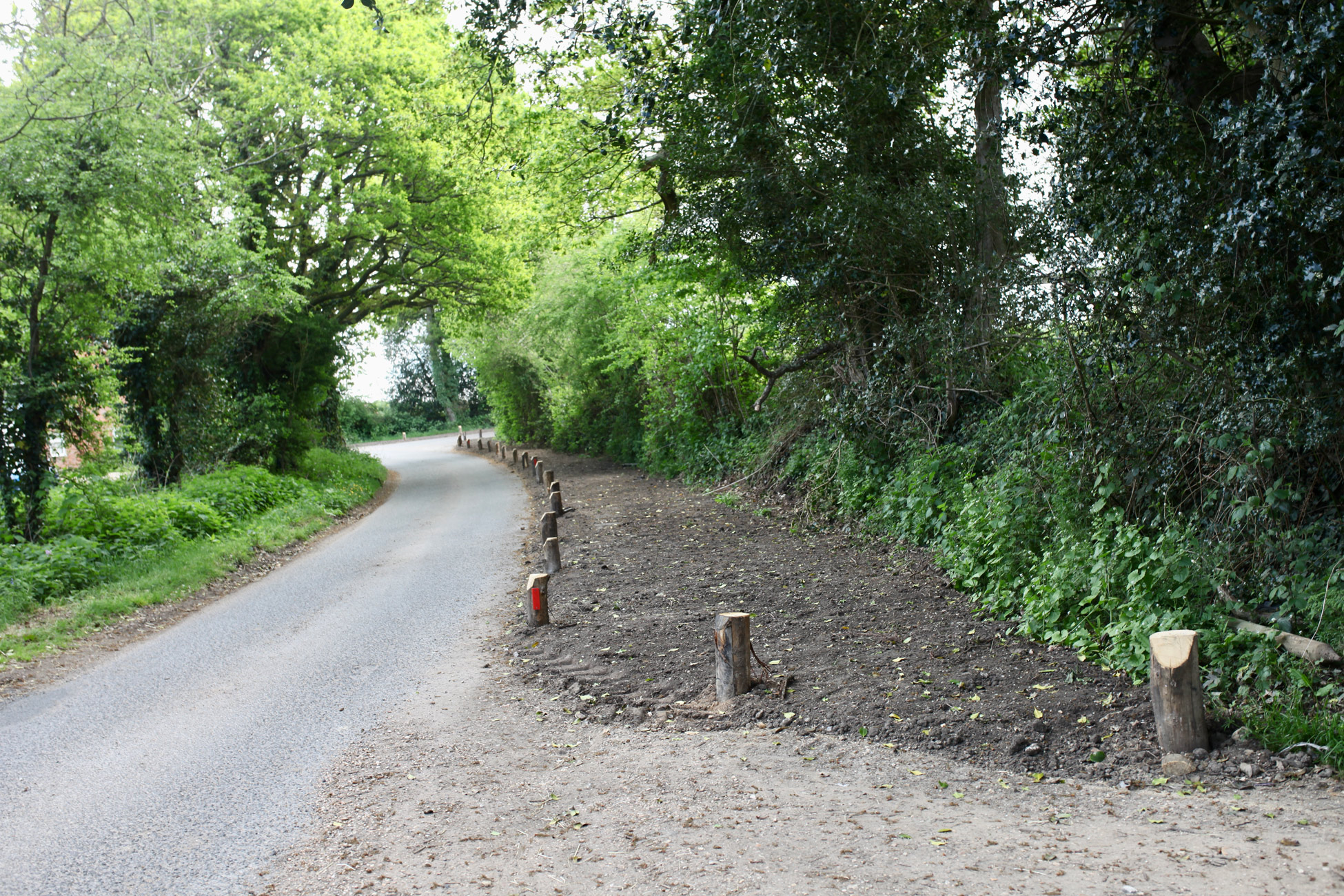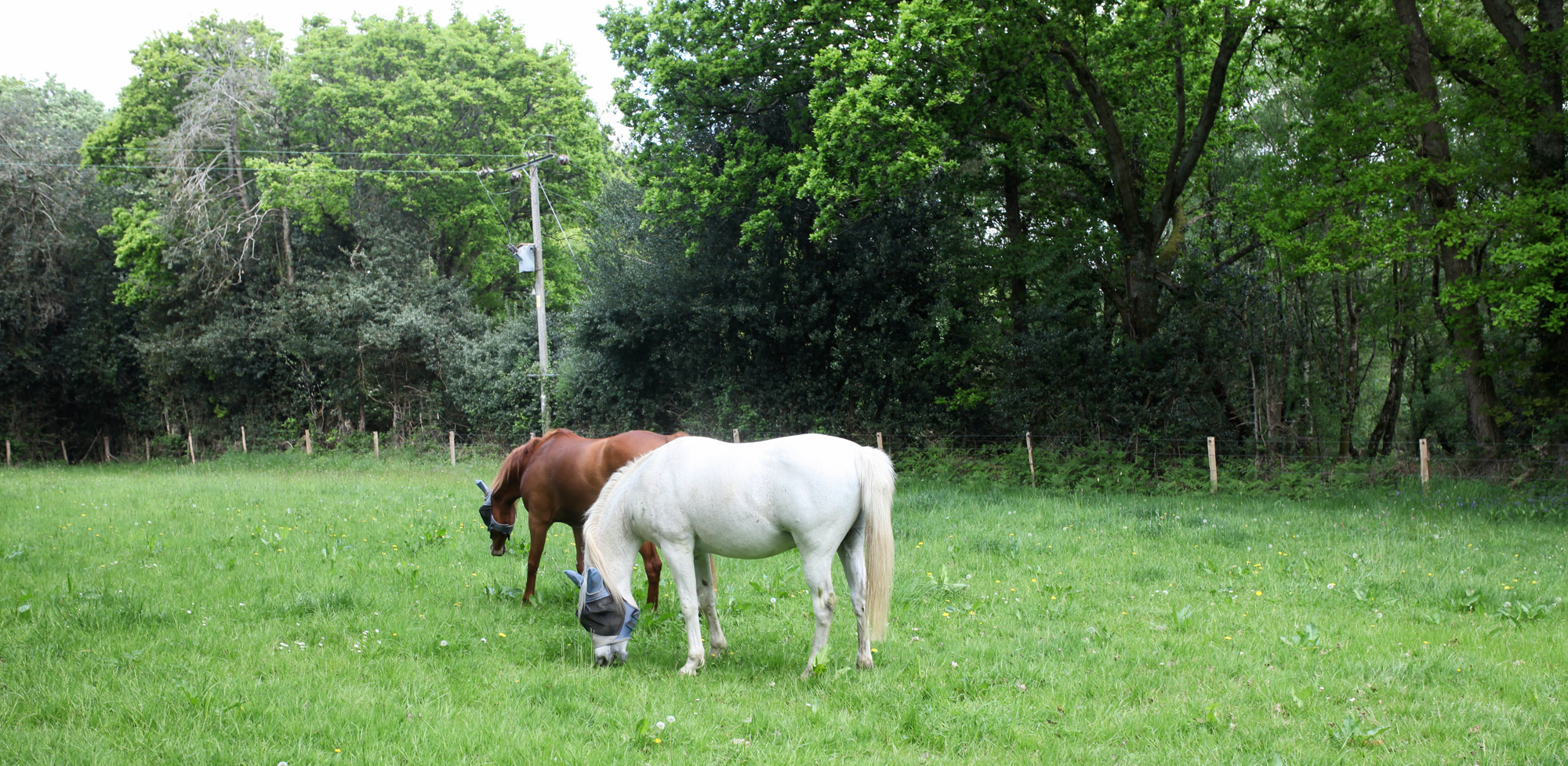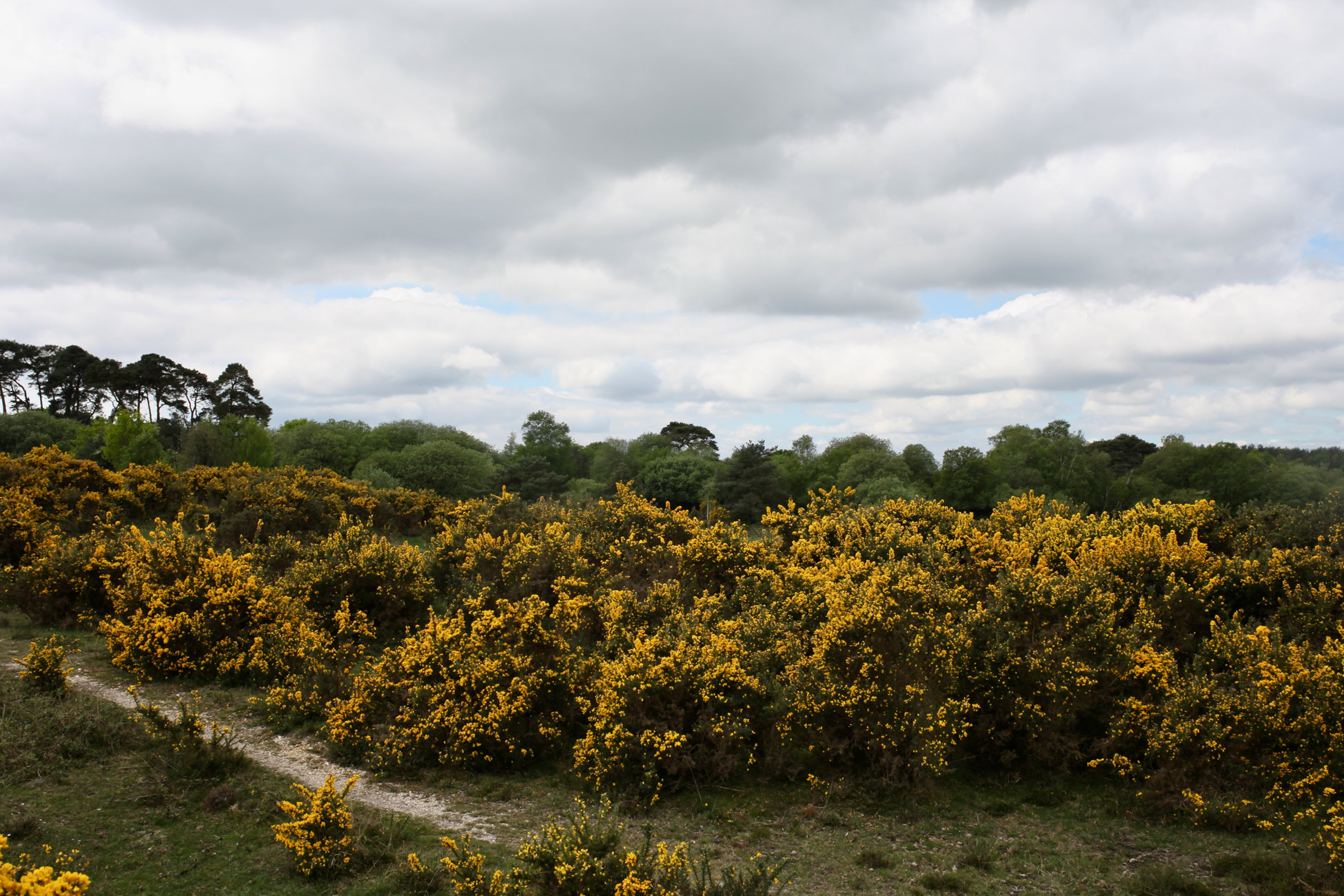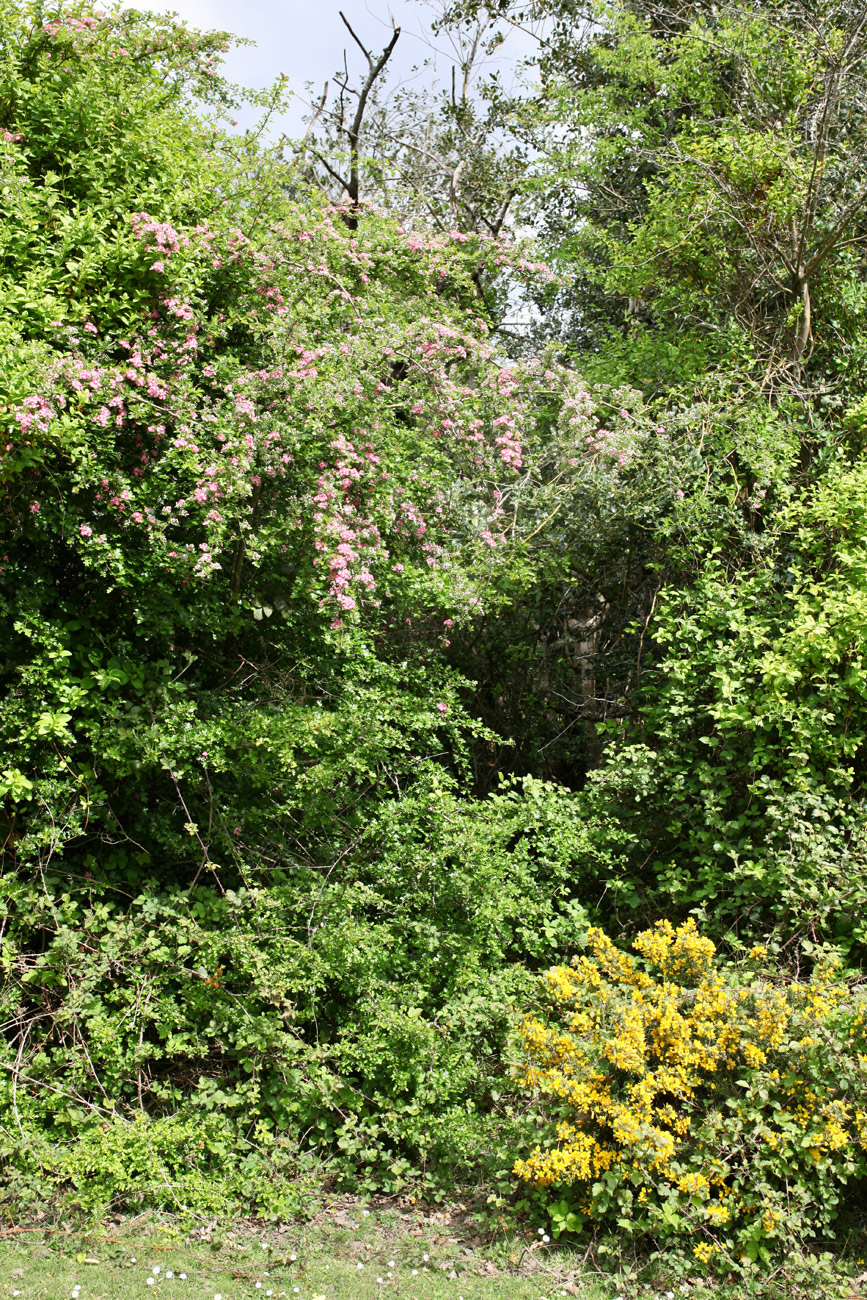After a visit to Ferndene Farm shop this morning Jackie drove me into the forest, where, as in Beckley Common Road,

posts protecting verges along lanes are being planted to keep off the eagerly anticipated summer influx of visiting vehicles.


Field horses along this road are already wearing their fly masks protecting eyes and ears from their own less welcome visitors.

I am not sure what crop we can expect to grace this opposite field.

A fairly widespread forest feature is the random apple tree such as these at Thorney Hill,




with its gorse-gold landscapes, and in



Forest Road . We could easily have focussed on many more today. Whenever we do we always speculate on the muncher whose apple core provided the seed for others to enjoy. Was it lobbed from a car?, tossed on a walk?, or chucked from a folding picnic chair?




Forest Road woodland also contains pink-hued hawthorn, otherwise known as may. We are enjoined ‘ne’er [to]cast a clout until May be out’, prompting a time-honoured controversy. A clout is an archaic word for an item of clothing; and cast means shed, as in take off. The proverb refers to putting aside our winter clothing. There is, however, no consensus as to whether the upper case month of May is meant, or the lower case may tree. If the old saw (proverb) refers to May, then ‘be out’ means ‘has ended’; if may, ‘be out’ signifies ‘has bloomed’. This may never be settled. Whichever is correct, today I wore shirt-sleeves, sans undershirt and sans jacket – with neither the English nor the American vest. So, with either interpretation, I have it covered.





Donkeys shedding winter coats cropped the verges on our return road out of Brockenhurst, while ponies kept clear of the tarmac.
This evening we dined on pork spare ribs and Jackie’s savoury rice with which she drank Hoegaarden, Flo drank Kombucha ginger and lemon, and I drank L’Ayrolle Fitou 2019.
Loved the discourse on possible meanings on the old proverb.
I enjoyed the discussion of the old proverb as well.
Loved the discourse on possible meanings on the old proverb.
Thanks very much, Pat. I had fun with that, so I’m pleased you liked it
Lovely explanation (that I was even able to understand).
Such fun to travel the road with you and enjoy the gorse-gold and the may, the horses and my favorite shaggy donkey losing his/her winter coat. Feeling trapped inside today, your post was a god-send! Happy Mother’s Day weekend to Jackie. I hope she feels loved & appreciated.
Thank you for Mothers day wishes dear Jan, and I return them to you knowing you are loved and appreciated you are such a lovely Mum. XX
Ever so grateful to you & Derrick for your friendship. I hope you feel celebrated as a mum today and every day, Jackie!


Thank you so much, Jan X
What a nice jaunt
Thanks very much, Val. X
Countryside looks lovely in your photos Derrick
Thanks very much, Sheree
Beautiful landscapes. I particularly like the first gorse landscape with the brooding clouds. Here today, you’d be adding them.
Here today, you’d be adding them.
I’m glad you could cast your clout.
Thanks very much, Merril. We have another pleasant day ahead
Wonderful!
Beautiful photos as always, Derrick! The poles that were put along the road have me wonder if there’s an easement that would preclude digging the holes and placing the poles there.
I don’t really understand the easement term, John. Whatever the law might say, only physical deterrents would stop visitors from parking on the verges. Thanks very much.
Back in my home state of Michigan, the law states that the county has a 30 foot easment from the centerline of the road, out to 30 feet. That’s all that it means, Derrick.
Ah. Thanks, John
I particularly like the black-and-white photo of the pony.
Thanks very much, Liz
You’re welcome, Derrick.
I think that it may possibly be a visitor to a garden which has eaten an apple off the ground and then provided the seed for a tree. Blackbirds and thrushes will all do this when the apple trees shed some of their bounty on the ground in September/October.
You are probably right, John. Thanks very much
Perhaps Johnny Appleseed has passed by.
Thanks very much, Tootlepedal
This post makes me think of how much there is to be thankful for – fly masks for horses, the gift of apple trees, beautifully colored blossoms, shaggy donkeys, and ponies playing it safe.
A lovely comment, JoAnna. Thanks very much
You are very welcome.
I enjoyed the scenes from your forest drive, Derrick and Jackie. Too bad the flies are bothering the horses and ponies already. I can’t really tell from the photo, but that unidentified crop may be wheat or oats.
It is interesting how language changes over time, isn’t it?
Thank you very much, Lavinia. The changes in language are intriguing – none more so in how the US has retained words that we have not – e.g. fall. You may be right about the crop
Is there any sgnificance Derrick, in placing the ‘donkey’ photos immediately below your intriguing explanation paragraph of the term ‘ne’er [to]cast a clout until May be out’, …
No – Ivor, but that is a very good question given hat they are shedding their winter coats. Thanks a lot
Have you ever tasted Kombucha? What is it like? I think I’ll stick to wine, anyhow.
Happy Mother’s Day, Jackie.
Thanks very much from us both, Yvonne. I haven’t tasted Kombucha myself.
Thank you for the Mothers Day wish.
Lovely outing today, Derrick. I loved the black and white pony shot.
Thanks very much, Jill
It is always lovely to see your forest photos.
Thanks very much, Arlene
Will you have a lot of increased traffic along your road this summer, Derrick? Your photos are lovely as always.
Thanks very much, Alys. We will have many visitors – I suspect more than usual this year.
That makes sense, given where we are with COVID. People are dying to get out and about.
Our Bitou (tickberry) bushes glow a similar yellow to your gorse – a beautiful natural highlighting As I enjoy looking into the etymology of words, I loved your stirring up of past and present meaings – and loved the cogitation about the origin of the apple trees!
As I enjoy looking into the etymology of words, I loved your stirring up of past and present meaings – and loved the cogitation about the origin of the apple trees!
Thank you so much, Anne. I had fun with that
I like the linguistic controversy. Photos are lovely.
I’m pleased you liked my little game, Dolly. Thank you very much.
You are very welcome, Derrick.
Now I have “Summer is a’ coming in, loudly sing Cuckoo’ banging in my mind. Which makes me bet it was birds who spread the apple seed.
John Knifton would agree with you, Gwen. Thanks very much
What beauty you captured!
You know I always love seeing the donkeys! Oh, good, they are getting ready for warmer climates.
I think you all had your Mother’s Day in March (???), but we are celebrating today. So I say, Happiness and Joy to Jackie! You are a wonderful mother!






And to all the mums in both your families!
I enjoy when you teach me about words, their origins, their meanings, their journeys through life. Thank you, Derrick!
Oh, I love thinking about how trees got their start! Whose core, indeed!

(((HUGS)))
Thank you so much from us both, Carolyn XX
Sheila’s grandparents lived in a house backing on to the railway line near Clapham Junction. She tells me they had a
veritable orchard of apple trees at the bottom of their garden, none of which her granddad had ever planted. They all came from apple cores thrown from the windows of passing trains. So if your apple trees were anywhere near the route of the old railway line that used to cross the New Forest to Ringwood and beyond, maybe that would be another source of the trees?
Could well be, Geoff. Thanks a lot
You give such wonderful commentaries for the landscape, flora and fauna!
Thanks very much, GP
Thanks for sharing. I really enjoyed it.
Much appreciated, Eunice
I encountered my first biting flies — huge, nasty things capable of drawing blood — a couple of days ago, and thought of your horses and donkeys. Perhaps our fly seasons are somewhat in synch. Thanks to your proverb and your discussion of it, I’ve added a couple more English words to my lexicon!
Thanks very much, Linda. I’m pleased to have helped
To earn money between semesters at the university, I worked on a ranch where horses were used to manage cattle herds. My horse, an Arabian gelding named Niran, was tired of being a workhorse and would balk at being ridden in the hot weather. When he balked, he stopped moving and forced me to dismount. This always happened miles from home base, of course! One day, when I was on my forced walk, I noticed a particular kind of biting insect on Niran’s neck. The horses hated them, the cows hated them, and I hated them because they bite people, too! So, empathetically, I swatted the fly on Niran’s neck. From that time on, Niran never made me walk. He discovered I had a practical skill he could make use of. LOL!
An intelligent horse, Doug. Thanks very much
Yes, I was (and am) amazed how intelligent horses are, how they communicate to humans their wishes.
The horses are beautiful.
And, certainly, seeing spring seeping through the landscape.
Thanks very much, Rabirius
Such beautiful landscapes and lovely photos of the animals. I enjoyed the discussion about the proverb. Seems you had nice weather, as well.
I love the golden pictures.
Thanks very much, Mrs W
Your welcome.
It is amazing, Derrick, but this is the second post I’ve read within a week that showed photographs of gorse bushes which I had never seen before. I am so pleased to know what they look like having read all about hiding in them in Enid Blyton’s Famous Five adventure books.
Thanks very much, Robbie. Fancy you having read about them and not seen them until now
I know, and I didn’t realise they were yellow and so pretty.
However those seeds arrived there, they did their job


Thanks very much, Ribana